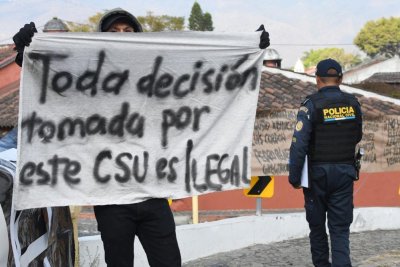Guatemala’s attorney general tied to alleged illegal adoption network

A protester holds a sign during a demonstration against the election process led by the state university and the candidacy of Guatemalan Attorney General Consuelo Porras for a Constitutional Court magistrate position in Antigua Guatemala, Guatemala, on Monday. The University of San Carlos, the state university, held an election to designate a magistrate to Guatemala’s Constitutional Court, but Porrwas excluded. Photo by Alex Cruz/EPA
Feb. 17 (UPI) — Human rights experts from the United Nations Office of the High Commissioner expressed concern about the possible link between Guatemala’s attorney general, Consuelo Porras, and alleged illegal adoptions of disappeared Indigenous children.
According to investigators, led by Special Rapporteur Margaret Satterthwaite, the adoptions would have occurred between 1968 and 1996 during Guatemala’s armed conflict — a period marked by human rights violations that particularly affected Indigenous communities.
The allegations refer particularly to 1982, when Porras headed the Elisa Martínez Temporary Home and allegedly acted as the “legal guardian” of minors who were later placed in irregular international adoptions.
“We are particularly concerned that a prompt, thorough, independent and impartial investigation has not been carried out into the alleged involvement of certain state authorities in these processes and that the mothers affected by these illegal adoptions have apparently received neither recognition nor adequate reparations,” the U.N. experts said in a statement.
The Elisa Martínez Home operated as a center under the Directorate of Child and Family Welfare with the authority to oversee national and international adoptions.
Once children entered the home, the director or person in charge became their legal guardian, allowing them to process adoption proceedings in Guatemala and abroad under the adoption regulations in force at the time, Prensa Libre reported.
The controversy arose as Porras sought to become a magistrate of the Constitutional Court, the country’s highest court, once her term at the Public Ministry ends in May.
According to analysts, the attorney general was seeking refuge in the high court to obtain the protection granted by immunity, and submitted her candidacy to the Superior University Council of the University of San Carlos of Guatemala, digital outlet LaHora.gt reported.
However, after the report was made public, the university excluded her from the list of candidates for the court, determining that she did not meet the requirements of suitability and integrity.
The Public Ministry reacted strongly to the U.N. report. In an official statement, it described the allegations as “spurious, malicious and biased,” arguing they are based on unverified information intended to interfere in the country’s sovereign processes.
In a post on X, Porras rejected the accusations against her as “false and politically instrumentalized.” She said they lack evidentiary support and “are completely malicious, and far from protecting human rights, they violate and distort them.”
Porras’ defense maintains that her role at the Elisa Martínez Temporary Home was administrative and that she had no legal authority over the final destination of the minors. The attorney general also announced she is weighing legal action against the U.N. experts, arguing that her presumption of innocence has been violated.
While the experts insist on the need for independent and thorough investigations, Porras maintains that she is facing “international political persecution” aimed at weakening her position at the head of the Public Ministry.
Consuelo Porras was appointed in 2018 and ratified in 2022 as attorney general and head of Guatemala’s Public Ministry. Although her mandate is focused on criminal prosecution, her tenure has been internationally questioned and sanctioned by more than 40 countries, including the United States and the European Union, over allegations of corruption and undermining democracy.
Porras has been accused of using the justice system as a political weapon to protect corruption networks and pursue independent prosecutors, judges and journalists, triggering repeated citizen protests that demand her resignation.
After the election of President Bernardo Arévalo in 2023, the Public Ministry under Porras initiated a series of legal actions to attempt to annul the election results and cancel the ruling party, Semilla.
Since Arévalo took office, the relationship between him and Porras has been marked by constant confrontation.
Arévalo has sought legal mechanisms and legislative reforms to remove her, while Porras has refused to attend Cabinet summonses and has kept multiple investigations open against the president’s inner circle, generating institutional paralysis and a deep political crisis in the country.
